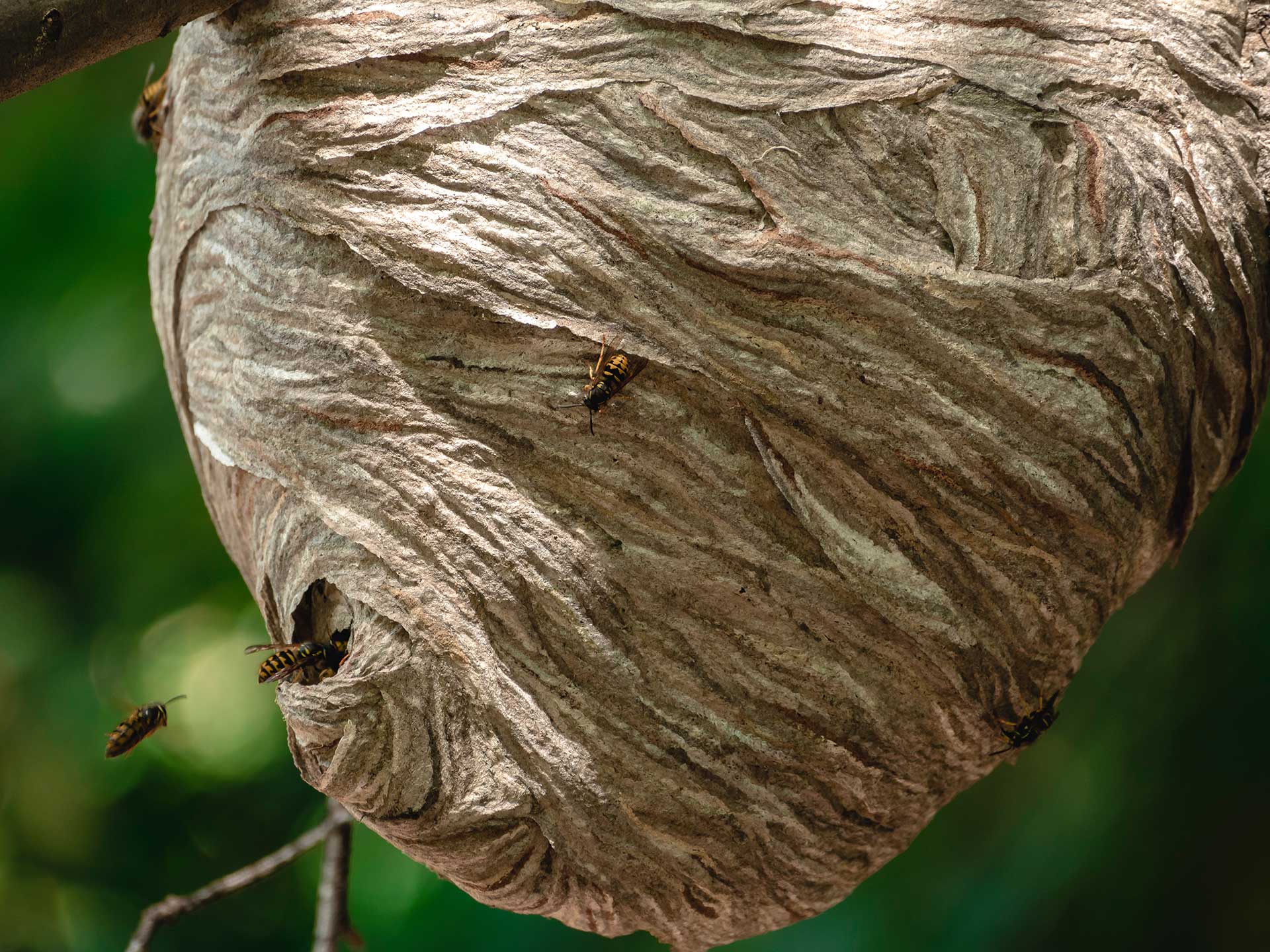Hornets, Bees, and Wasps: Know the Differences for Safe Removal

As the weather heats up in spring and summer, it is common for Massachusetts residents to find uninvited buzzing guests in their backyards. Hornets, bees, and wasps all pose a potential threat to their human neighbors–especially if one of those neighbors is allergic. While these creatures are vital to our natural ecosystem, they can be dangerous in residential areas. The first step in dealing with these black and yellow insects is determining whether they are hornets, bees, or wasps.
With years of experience and specialized knowledge, the Bee Hunter of Massachusetts is here to guide you on this journey. We provide professional removal services, guaranteeing a safe and secure environment for you and your family.
How to Identify Different Types of Bees
Hornets
Hornets are one of the largest varieties of wasps. Some species can be up to two inches long. Unlike bees, a hornet’s body is smooth and shiny, colored black, white, and yellow. Their nests are large and enclosed. They typically prefer to build nests hanging from trees or shrubs.
While they may appear intimidating, hornets are not usually aggressive unless provoked. Despite this, a hornet sting is painful and could lead to severe allergic reactions in some individuals. Hornets have a stinger that can penetrate clothing, and they leave more venom than do wasps. Unlike bees, hornets can sting multiple times; if a human makes one angry enough, the hornet will release pheromones into the air to alert its colony that it is under attack and mobilize all of them to come after the offender.
Honey and Bumble Bees
Bees are pollinators. Our environment cannot survive without them. They are fuzzy with yellow and black stripes. Generally, they’re more robust and rounder than wasps and hornets. Honeybees and bumblebees are two common species you may encounter. Honeybees are the “good” bees. I will try to capture a hive or swarm of honeybees alive if I can, rather than killing them. Their role in pollinating crops and plants is important and beneficial to our society.
Bumblebees are often found inside flowers, enjoying the sweet nectar. They are docile creatures but will defend their homes if threatened. Resist the urge to pet them! While they can sting, bees typically only do so in self-defense. Honeybees can only sting once, after which they die, while bumblebees can sting multiple times.
Wasps
Wasps are not bees, although they are often confused with bees. Wasps are thinner and longer than bees, with a distinctive tiny waist. They have less hair on their bodies and are typically more aggressive–especially in late summer. Wasps can sting multiple times, making them especially dangerous for people with insect allergies. Wasps come in many colors and sizes. Some are red, yellow, black and blue; others are larger than their counterparts. There are more than 100,000 species of wasps worldwide and 4,000 types in the United States; bald-faced hornets and yellowjackets are among the most common species.
They do, however, have some benefits. Wasps are predators, feeding on other insects. Their predatory nature makes them suitable for natural pest control.
When wasps die, they release pheromones in the air that other members of their colony can smell. These serve as a warning signal to their comrades, but if you are the cause of their death and those pheromones land on your skin, it could trigger an entire wasp colony to come after you.
How to Safely Remove and Relocate Bees
Do not attempt to remove these pests independently. Any wrong move can provoke them into swarming, putting you, your family, and your pets at risk. Hire a professional like the Bee Hunter of Massachusetts to do the job. Our professionals are trained with specialized equipment and methods to remove these pests while protecting our clients and the ecosystem.
Rusty Dillon originally learned his trade from The Bee Hunter of Pittsburgh, PA. For more than 25 years The Bee Hunter franchise has been safely removing bees, wasps and other stinging insects from residential homes and commercial businesses. The Bee Hunter of Massachusetts will safely remove wasps’ nests and other stinging insects from your property. If you have unwanted bees, wasps, hornets, or other stinging insects that are endangering your safety and peace, call The Bee Hunter of Massachusetts. He will safely remove beehives, wasps’ nests, and other stinging insects from your property.
Now that you can identify the insects in your yard, let The Bee Hunter of Massachusetts safely remove them. The Bee Hunter of Massachusetts is the right pest control company for anyone wanting a safe, environmentally friendly solution to their insect problem. Request an appointment today!
